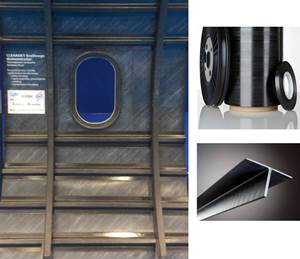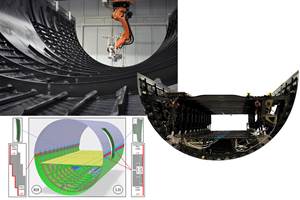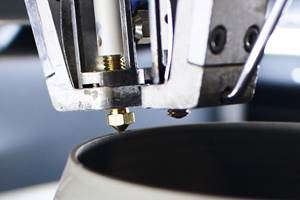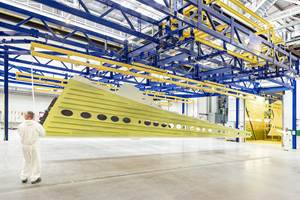Cold cutting equipment designed for carbon fiber
CAMX 2024: Sheffield, a producer of highly accurate cutting machines, highlights its C-503 model machine made to cut carbon fiber, fiberglass and even natural fibers.
Share
Sheffield Cutting Equipment (El Cajon, Calif., U.S.) develops and manufactures more than 80 different types and variations of highly accurate cutting machines, including specialized machines for cutting carbon fiber, as well as slitting machines. The company is exhibiting a few of its cold cutting equipment live for attendees, including its C-503 model, which is made specifically to cut carbon fiber from a roll.
Sheffield reports that its cutting equipment is used to cut 90% of all seat belts in North America for automotive and the airline industry. It also manufacturers custom machines for fall protection, medical and the U.S. military.
The C-503 model offers an adjustable feeding speed up to 14" per sec. Gear-driven rollers help maintain tolerances of ±0.001% of total length, and there are four settings to measure in inches and mm. The machine is capable of cutting from 1/16" to 300' in length with a 9"-wide knife. In addition to cutting carbon fiber, it can also process fiberglass and natural fibers like cotton.
Using this equipment is meant to automate the labor-intensive job of manually cutting materials. The operator simply installs a roll of material on the roll stand that comes with the machine, selects the quantity and length of each piece, presses the start button and can walk away from the machine. When the counter reaches the set quantity, the machine automatically stops and a beeper comes on to let the operator know that it has finished.
Related Content
-
PEEK vs. PEKK vs. PAEK and continuous compression molding
Suppliers of thermoplastics and carbon fiber chime in regarding PEEK vs. PEKK, and now PAEK, as well as in-situ consolidation — the supply chain for thermoplastic tape composites continues to evolve.
-
Manufacturing the MFFD thermoplastic composite fuselage
Demonstrator’s upper, lower shells and assembly prove materials and new processes for lighter, cheaper and more sustainable high-rate future aircraft.
-
A new era for ceramic matrix composites
CMC is expanding, with new fiber production in Europe, faster processes and higher temperature materials enabling applications for industry, hypersonics and New Space.
Related Content
PEEK vs. PEKK vs. PAEK and continuous compression molding
Suppliers of thermoplastics and carbon fiber chime in regarding PEEK vs. PEKK, and now PAEK, as well as in-situ consolidation — the supply chain for thermoplastic tape composites continues to evolve.
Read MoreManufacturing the MFFD thermoplastic composite fuselage
Demonstrator’s upper, lower shells and assembly prove materials and new processes for lighter, cheaper and more sustainable high-rate future aircraft.
Read MoreA new era for ceramic matrix composites
CMC is expanding, with new fiber production in Europe, faster processes and higher temperature materials enabling applications for industry, hypersonics and New Space.
Read MorePlant tour: Spirit AeroSystems, Belfast, Northern Ireland, U.K.
Purpose-built facility employs resin transfer infusion (RTI) and assembly technology to manufacture today’s composite A220 wings, and prepares for future new programs and production ramp-ups.
Read MoreRead Next
VIDEO: High-volume processing for fiberglass components
Cannon Ergos, a company specializing in high-ton presses and equipment for composites fabrication and plastics processing, displayed automotive and industrial components at CAMX 2024.
Read MoreAll-recycled, needle-punched nonwoven CFRP slashes carbon footprint of Formula 2 seat
Dallara and Tenowo collaborate to produce a race-ready Formula 2 seat using recycled carbon fiber, reducing CO2 emissions by 97.5% compared to virgin materials.
Read More“Structured air” TPS safeguards composite structures
Powered by an 85% air/15% pure polyimide aerogel, Blueshift’s novel material system protects structures during transient thermal events from -200°C to beyond 2400°C for rockets, battery boxes and more.
Read More










